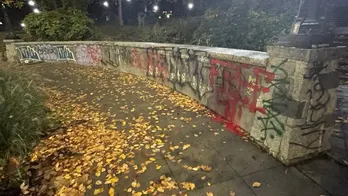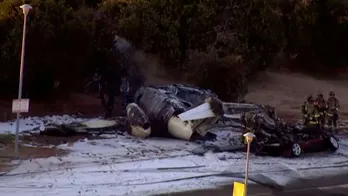Japan's Fukushima nuclear plant leaked radioactive water, officials say
Highly radioactive water leaked from a treatment machine at the tsunami-hit Fukushima Daiichi nuclear power plant, but no one was injured and radiation monitoring shows no impact to the outside environment, the utility operator said Thursday.
A plant worker found the leak Wednesday morning during valve checks at a SARRY treatment machine designed to mainly remove cesium and strontium from the contaminated water, the Tokyo Electric Power Company Holdings said. The machine has been idled for maintenance work.
An estimated 6 tons of radioactive water — enough to fill two ordinary backyard swimming pools — leaked out through an air vent, leaving a pool of water on an iron plate outside and seeping into the soil around it, TEPCO said, but no radioactive water escaped the compound.
JAPAN TO RELEASE FUKUSHIMA NUCLEAR WASTEWATER INTO OCEAN ON THURSDAY
Radioactivity of the leaked water was 10 times the legally releasable limit, TEPCO said. The pool of water had been wiped off and the contaminated soil is being removed, TEPCO spokesperson Kenichi Takahara said.

The Fukushima Daiichi nuclear power plant is seen from the nearby Ukedo fishing port in Namie town, northeastern Japan, on Aug. 24, 2023. Highly radioactive water leaked from a treatment machine at the plant this week. (AP Photo/Eugene Hoshiko, File)
It's not clear when the machine began leaking, but TEPCO said that no problems were detected in an inspection Tuesday.
The leak may have been caused by valves left open while workers flushed the machine with filtered water — a process intended to reduce radiation levels before the maintenance work, Takahara said. TEPCO said that 10 of 16 air valves that should have been closed were left open during the flushing, and the leak stopped when the valves were closed.
Radiation levels around the plant and inside gutters on the compound have showed no increase.
The filtering machine is part of TEPCO's controversial wastewater discharge project, which began in August. The Fukushima Daiichi plant suffered triple meltdowns following the 2011 quake and tsunami.
The discharges, which are expected to continue for decades, have been strongly opposed by fishing groups and neighboring countries, including China, which immediately banned imports of all Japanese seafood.
1ST RELEASE OF TREATED FUKUSHIMA NUCLEAR WASTEWATER COMPLETE, OPERATOR SAYS
Chinese Foreign Ministry spokesperson Wang Wenbin at a daily briefing Thursday said the latest incident highlighted management problems at TEPCO and questioned its ability to safely carry out the decades-long treated water discharge.
Wang urged Japan to respond to the concerns of the international community and handle the discharge responsibly while cooperating with an independent and long-term monitoring system involving neighboring countries and other stakeholders.
The latest leak comes only months after another accidental leak at a separate treatment facility called the Advanced Liquid Processing System, or ALPS.
In that accident, four workers were sprayed with radioactive liquid waste while cleaning the ALPS piping. Although two of them were briefly hospitalized for skin contamination, none showed symptoms of poisoning.
Disclaimer: The copyright of this article belongs to the original author. Reposting this article is solely for the purpose of information dissemination and does not constitute any investment advice. If there is any infringement, please contact us immediately. We will make corrections or deletions as necessary. Thank you.







